Boehner's aboard: Obama gains Syria-strike support
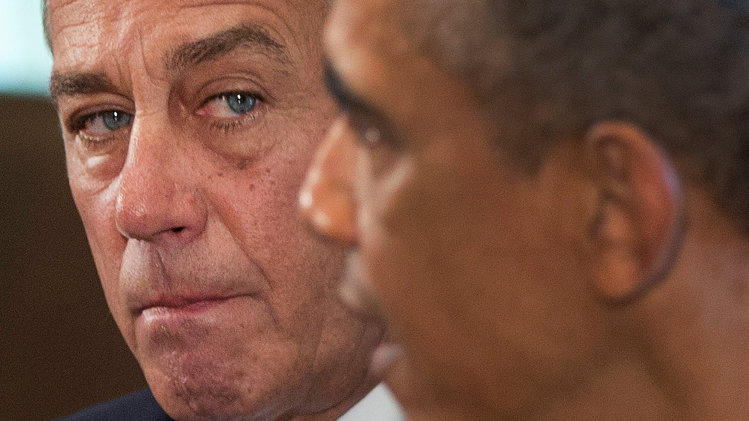
WASHINGTON (AP) —
President Barack Obama gained ground
Tuesday in his drive for congressional backing of a military strike
against Syria, winning critical support from House Speaker John Boehner
while key Senate Democrats and Republicans agreed to back a
no-combat-troops-on-the-ground action in retaliation for a chemical
weapons attack.
Officials said the emerging Senate measure would
receive a vote Wednesday in the Senate Foreign Relations Committee.
Approval is likely.
"You're probably going to win" Congress'
backing, Sen. Rand Paul of Kentucky, a conservative and likely opponent
of the measure, conceded in a late-afternoon exchange with Secretary of
State John Kerry.
The leader of House Republicans, Boehner emerged
from a meeting at the White House and said the United States has
"enemies around the world that need to understand that we're not going
to tolerate this type of behavior. We also have allies around the world
and allies in the region who also need to know that America will be
there and stand up when it's necessary."
Boehner spoke as
lawmakers in both parties called for changes to the president's
requested legislation, insisting it be rewritten to restrict the type
and duration of any military action.
In
the Senate, the compromise was the work of Sens. Bob Menendez, D-N.J.,
and Bob Corker, R-Tenn., among others. They are the chairman and senior
Republican, respectively, on the Foreign Relations Committee, which held
a lengthy hearing during the day on Obama's request for congressional
legislation in support of the military reprisal he wants.
The
measure would set a time limit of 60 days and says the president could
extend that for 30 days more unless Congress votes otherwise.
The measure also bars the use of U.S. ground troops for "combat operations."
The
White House had no immediate reaction to the Senate measure, although
Kerry, testifying earlier before the committee, signaled that the troop
restriction was acceptable to the administration. "There's no problem in
our having the language that has zero capacity for American troops on
the ground," he said.
"President Obama is not asking America to go
to war," Kerry said in a strongly worded opening statement. He added,
"This is not the time for armchair isolationism. This is not the time to
be spectators to slaughter."
Obama
said earlier in the day he was open to revisions in the relatively
broad request the White House made over the weekend. He expressed
confidence Congress would respond to his call for support and said
Assad's action "poses a serious national security threat to the United
States and to the region.
The administration says 1,429 died from
the attack on Aug. 21 in a Damascus suburb. Casualty estimates by other
groups are far lower, and Assad's government blames the episode on
rebels who have been seeking to overthrow his government in a civil war
that began over two years ago. A United Nations inspection team is
awaiting lab results on tissue and soil samples it collected while in
the country before completing a closely watched report.
The
president met top lawmakers at the White House before embarking on an
overseas trip to Sweden and Russia, leaving the principal lobbying at
home for the next few days to Vice President Joe Biden and other members
of his administration.
Kerry, Defense Secretary Chuck Hagel and
Gen. Martin Dempsey, chairman of the Joint Chiefs of Staff, sat
shoulder-to-shoulder at the Senate committee hearing while, a few
hundred miles away, United Nations Secretary-General Ban Ki-moon urged
caution. He said any punitive action against Syria could unleash more
turmoil and bloodshed, and he advised that such strikes would be legal
only in self-defense under the U.N. Charter or if approved by the
organization's Security Council. Russia and China have repeatedly used
their veto power in the council to block action against Assad.
In
the Middle East, Israel and the U.S. conducted a joint missile test over
the Mediterranean in a display of military might in the region.
Obama
set the fast-paced events in motion on Saturday, when he unexpectedly
stepped back from ordering a military strike under his own authority and
announced he would seek congressional approval.
Recent presidents
have all claimed the authority to undertake limited military action
without congressional backing. Some have followed up with such action.
Obama
said he, too, believes he has that authority, and House Democratic
leader Nancy Pelosi said during the day that even Congress' refusal to
authorize the president wouldn't negate the power of the commander in
chief.
Still, the president also has stated that the United States
will be stronger if lawmakers grant their support. But neither Obama
nor his aides has been willing to state what options would be left to
him should Congress reject his call.
As Obama has often noted, the
country is weary of war after more than a decade of combat deaths in
Afghanistan and Iraq, and there is residual skepticism a decade after
Bush administration claims went unproven that Saddam Hussein possessed
weapons of mass destruction. Additionally, a spate of polls indicates
the public opposes a military strike against Syria, by a margin of 59-36
percent if the United States acts unilaterally, according to a new
Washington Post-ABC survey, and a narrower 46-51 if allies take part.
Among
major allies, only France has publicly offered to join the United
States in a strike, although President Francois Hollande says he will
await Congress' decision. The British House of Commons rejected a
military strike last week.
Yet the president's decision to seek congressional approval presents lawmakers with a challenge, as well.
Even some of Obama's sternest critics in Congress expressed strong concerns about the repercussions of a failure to act.
House
Majority Leader, Eric Cantor, R-Va., said after Tuesday's White House
meeting that a failure to respond to the use of chemical weapons "only
increases the likelihood of future WMD (weapons of mass destruction) use
by the regime, transfer to Hezbollah, or acquisition by al-Qaida."
America's largest pro-Israel organization, AIPAC, also announced its support for legislation to authorize a military strike.
Apart from the meeting with Obama, the White House provided closed-door briefings for members of Congress.
Sen.
Jeff Flake, R-Ariz., said after attending one session that
administration officials told lawmakers that the targets the military
had identified last week were still present, despite the highly public
discussion of a possible attack. "Seems strange to see some targets
still available several weeks later," Flake said, adding that he was
"still listening" to the administration's lobbying.
Dempsey
addressed the same point later in the day. "Time works both ways," he
told the Senate panel. He said the United States has significant
intelligence about Assad's actions, and "we continue to refine our
targets."
Others were firmly opposed. Sen. Jim Inhofe of Oklahoma
said on Fox News, "It may sound real easy when people like Secretary
Kerry say that 'it is going to be quick and we're going to go in, we're
going to send a few cruise missiles, wash our hands and go home.' It
doesn't work that way. This could be a war in the Middle East, it's
serious."
Paul, the Kentucky Republican who has close ties to tea
party groups, said he probably would vote against authorizing Obama to
use force. But he said it also wouldn't be helpful to amend the
resolution in a way that constrains the president too much to execute
military action, if authorized.
He
made his prediction that the White House would get its way in an
exchange with Kerry in which he said Obama should agree to abide by
Congress' decision, rather than reserve the right to order a strike even
if the vote goes against him.
Democrats, too, were divided,
although it appeared the administration's biggest concern was winning
support among deeply conservative Republicans who have battled with the
president on issue after issue since winning control of the House three
years ago.
The United States maintains a significant military
force in the eastern Mediterranean Sea. The U.S. Navy released one of
the warships that had been in the region, leaving four destroyers armed
with cruise missiles, the USS Stout, USS Gravely, USS Ramage and USS
Barry. Also in the area was an amphibious warship, the USS San Antonio,
with about 300 Marines aboard.
In addition, there are two aircraft
carriers in the region — the USS Nimitz strike group, which is in the
southern Red Sea, and the USS Harry S Truman, which is in the Arabian
Sea.
___Associated Press writers Julie Pace, Josh Lederman, Donna Cassata, Alan Fram, Jennifer C. Kerr and Lolita C. Baldor contributed to this report.
Obama wins backing for Syria strike from key figures in Congress

WASHINGTON/BEIRUT
(Reuters) - President Barack Obama won the backing of key figures in the
U.S. Congress, including Republicans, in his call for limited U.S.
strikes on Syria to punish President Bashar al-Assad for his suspected
use of chemical weapons against civilians.
Leaders of the U.S.
Senate Foreign Relations Committee said they reached an agreement on a
draft authorization for the use of military force in Syria, paving the
way for a vote by the committee on Wednesday. However, the draft is much
narrower than the request made by Obama and includes a provision
barring the use of U.S. troops on the ground.
Speaking after the
United Nations said two million Syrians had fled a conflict that posed
the greatest threat to world peace since the Vietnam war, Obama said on
Tuesday the United States also has a broader plan to help rebels defeat
Assad's forces.
"What we are envisioning is something limited. It
is something proportional. It will degrade Assad's capabilities," Obama
said. "At the same time we have a broader strategy that will allow us
to upgrade the capabilities of the opposition."
Having startled friends and foes alike by delaying a punitive attack on
Assad until Congress reconvenes and agrees, Obama met congressional
leaders at the White House to urge a prompt decision and assure them it
did not mean another long war like Iraq or Afghanistan.
John
Boehner, the Republican speaker of the U.S. House of Representatives,
and House Majority Leader Eric Cantor both pledged their support for
military action after the meeting.
Votes are expected to be held
in the Senate and House next week, with the Republican-led House
presenting the tougher challenge for Obama.
The House leadership
has indicated the votes will be "conscience votes," meaning they will
not seek to influence members' votes on party lines. All the same, it
would have been a blow to Obama if he had not secured the backing of the
top two Republicans.
"I believe that my colleagues should support this call for action," Boehner told reporters.
The president said strikes aimed at punishing the use of chemical
weapons would hurt Assad's forces while other U.S. action would bolster
his opponents - though the White House has insisted it is not seeking
"regime change."
Among other provisions, the Senate Foreign
Relations Committee draft, which was obtained by Reuters, sets a 60-day
limit on U.S. military action in Syria, with a possibility of a single
30-day extension subject to conditions.
COMPROMISE DEAL
The compromise deal reached by Senator Robert Menendez, the Democratic
chairman of the panel, and Senator Bob Corker, the top Republican,
includes a provision banning any use of U.S. armed forces on the ground
in Syria, according to the draft document.
It requires Obama to
consult with Congress and submit to the Senate and House of
Representatives foreign relations panel a strategy for negotiating a
political settlement to the Syria conflict, including a review of all
forms of assistance to the rebels fighting to oust Assad.
Secretary of State John Kerry initially told the committee he would
prefer not to bar the use of ground troops to preserve options if Syria
"imploded" or there was a threat of chemical weapons being obtained by
extremists.
But when Corker, the Republican senator, told Kerry
he "didn't find that a very appropriate response regarding boots on the
ground," Kerry quickly, and repeatedly, backtracked.
Kerry said
he was simply "thinking out loud" and raising a hypothetical situation,
but he did not want to leave the door open to sending ground troops to
Syria.
"Let's shut the door now," Kerry said. "The answer is,
whatever prohibition clarifies it to Congress or the American people,
there will not be American boots on the ground with respect to the civil
war."
An Reuters/Ipsos poll showed on Tuesday that Obama has
failed so far to convince most Americans. Some 56 percent of those
surveyed said the United States should not intervene in Syria, while
only 19 percent supported action, essentially unchanged from last week.
In remarks that appeared to question the legality of U.S. plans to strike Syria without U.N. backing, Secretary-General Ban Ki-moon said the use of force is only legal when it is in self-defense or with Security Council authorization.
If U.N. inspectors confirm the use of chemical weapons in Syria, the Security Council, which has been deadlocked on the 2-1/2-year Syrian civil war, should overcome its differences and take action, Ban said.
Assad denies deploying poison gas that killed hundreds of civilians last month.
The Syrian opposition, which said a forensic scientist had defected to the rebel side bringing evidence of the Assad forces' use of sarin gas in March, has appealed to Western allies to send them weapons and use their air power to end a war that has killed more than 100,000 and made millions homeless.
COMFORTABLE GOING FORWARD
Obama has said he is "comfortable going forward without the approval of
a United Nations Security Council that so far has been completely
paralyzed and unwilling to hold Assad accountable.
The presence
in rebel ranks of Islamist militants, some of them close to al Qaeda,
has made Western leaders wary, while at the same time the undoubted -
and apparently accelerating - human cost of the conflict has brought
pressure to intervene.
Russia, backed by China, has used its veto
power in the U.N. Security Council three times to block resolutions
condemning Assad's government and threatening it with sanctions. Assad,
like Russia, blames the rebels for the August 21 gas attack.
Obama was due to leave Washington on Tuesday for a G20 meeting in
Russia. France said foreign ministers of some of the G20 member states
will convene on the sidelines of the meeting to discuss Syria.
The conflict has divided the Middle East on sectarian lines, with
Shi'ite Iran backing Assad and Washington's Sunni Arab Gulf allies
supporting the mainly Sunni rebels. It has also revived Cold War-style
tensions between the Western powers and Moscow.
In an interview in Le Figaro, Assad told the French newspaper:
"Everybody will lose control of the situation when the powder keg blows.
There is a risk of a regional war."
The U.N. High Commission for
Refugees said there had been a near tenfold increase over the past 12
months in the rate of refugees crossing Syria's borders into Turkey,
Iraq, Jordan and Lebanon - to a daily average of nearly 5,000 men, women
and children.
This has pushed the total number of Syrians living abroad to more than 2 million.
That represents some 10 percent of Syria's population, the UNHCR said.
With a further 4.25 million estimated to have been displaced but still
resident inside the country, close to one third of all Syrians are
living away from their original homes.
Comparing the figures to
the peak of Afghanistan's refugee crisis two decades ago, U.N. High
Commissioner for Refugees Antonio Guterres, said: "Syria has become the
great tragedy of this century - a disgraceful humanitarian calamity with
suffering and displacement unparalleled in recent history.
"The risks for global peace and security that the present Syria crisis
represents, I'm sure, are not smaller than what we have witnessed in any
other crisis that we have had since the Vietnam war," said Guterres, a
former Portuguese prime minister.
(Additional reporting by Tom
Miles and Stephanie Nebehay in Geneva, Steve Gutterman and Timothy
Heritage in Moscow, Jeffrey Heller and Dan Williams in Jerusalem, Dasha
Afanasieva in Istanbul and Phil Stewart, Arshad Mohammed, Susan Cornwell
and Andy Sullivan in Washington.; Writing by Claudia Parsons.; Editing
by Christopher Wilson, Jim Loney and Raju Gopalakrishnan)
Kegagalan Demi Kegagalan Amerika dan Israel
https://www.facebook.com/BeritaHarianSuriah
------------------------------------------------------
http://www.liveleak.com/view?i=7f4_1377959586
Thanks to Doreid Mohamad for this post
(translated from arab to italian and then from italian to english, sorry if there are errors)
According to the Oklahoman newspaper Post, citing U.S. military sources that the F-22 Raptor crashed in the north of Jordan, sources tell about the possibility of shoot down the F-22 Raptor aircraft by a Syrian missile Syrian everything and happened near the Syrian border, while a military expert John Blu Reed told the newspaper that the shoot down of the F-22 Raptor confirmation that Syria has a defense system updated the S-300, S 400 missiles or rockets, l 'U.S. expert also stated that U.S. relations - Russia will be even more strained if it is confirmed that Russia has provided to Syria missiles S 400.On the other hand according to reports from the United States, according to the Los Angeles Times of America, the Syrian defense forces have shot down four missiles launched by the Americans type Tomahawk, sources tell us that it was the defense systems (Bentsr 1) anti-aircraft missiles that have made that American missiles struck, and centered in the middle, the sources of Washington state that four missiles were launched to test the degree of defense of the Syrian forces, the sources have also confirmed that one of the main reasons in stopping aggression against Syria is the overthrow of the American F-22 Raptor crashed yesterday in the north of Jordan, also also deal with the part of the Syrian air defense missiles to the four Tomahok, daa remember that Jordan is still home to its territory five F-22, and this was one of the main reasons to postpone the trial of aggression against Syria.
Other sources:
http://www.southlebanon.org/?p=87063
http://nrttv.com/nrt-ar/dreje.aspx?jimare=20333
5. Update terbaru dari Russia Today, radar peringatan Rusia mendeteksi peluncuran dua roket balistik di bagian timur Laut Mediterania , Menteri Pertahanan Rusia menyatakan bahwa Israel bertanggung jawab atas penembakan roket tersebut. Peluncuran berlangsung jam 06:16 GMT, Selasa (hari ini). Lintasan rudal dilaporkan melewati bagian tengah Laut Mediterania menuju daratan timur. Kedua roket akhirnya sukses nyemplung ke laut.
http://rt.com/news/ballistic-launch-eastern-mediterranean-343/
Alhamdulillah, Thank-You Allah
*)Foto yang saya gunakan adalah kondisi Medeterania hari ini.
------------------------------------------------------
1. Menggunakan jasa Islam garis keras, AS mensupport habis-habisan
terrorist Suriah. Sayang sekali, hampir 3 tahun sudah perang ini
berlangsung, tidak ada tanda-tanda
kemenangan berpihak pada AS, sebaliknya Bashar al-Assad yang diramalkan
akan segera jatuh, malah semakin kuat dan semakin disegani di dunia
internasional.
http://www.reuters.com/article/2012/08/01/us-usa-syria-obama-order-idUSBRE8701OK20120801
2. Russia telah memenuhi kontrak kerjasama antara Suriah-Rusia tentang penjualan S-300, sempat dikecam dan dibujuk oleh Netanyahu untuk menggagalkan rencana tersebut, namun Rusia tidak bergeming dan saat ini S-300 sudah berada di Suriah.
http://www.israelhayom.com/site/newsletter_article.php?id=9297
3. “Mujahidin” Amerika loyo, maka rencana intervensi langsung pun mencuat. Alasannya adalah penggunaan senjata kimia oleh resim Assad, hanya saja tuduhan itu tidak terbukti, sebaliknya justru pemberontak yang mengakui telah menggunakan senjata kimia tersebut yang dipasok oleh Arab Saudi. http://www.freerepublic.com/focus/f-news/3061182/posts
4. 31 Agustus, F22 raptor Amerika rontok di sebelah utara Yordania. Katanya, untuk uji coba pertahanan Suriah. Dengan hasil memalukan tersebut, AS menunda serangan mereka terhadap Suriah, disamping factor lain yaitu ciutnya nyali beberapa sekutu AS untuk terjun langsung di Suriah http://www.liveleak.com/view?i=7f4_1377959586
http://www.reuters.com/article/2012/08/01/us-usa-syria-obama-order-idUSBRE8701OK20120801
2. Russia telah memenuhi kontrak kerjasama antara Suriah-Rusia tentang penjualan S-300, sempat dikecam dan dibujuk oleh Netanyahu untuk menggagalkan rencana tersebut, namun Rusia tidak bergeming dan saat ini S-300 sudah berada di Suriah.
http://www.israelhayom.com/site/newsletter_article.php?id=9297
3. “Mujahidin” Amerika loyo, maka rencana intervensi langsung pun mencuat. Alasannya adalah penggunaan senjata kimia oleh resim Assad, hanya saja tuduhan itu tidak terbukti, sebaliknya justru pemberontak yang mengakui telah menggunakan senjata kimia tersebut yang dipasok oleh Arab Saudi. http://www.freerepublic.com/focus/f-news/3061182/posts
4. 31 Agustus, F22 raptor Amerika rontok di sebelah utara Yordania. Katanya, untuk uji coba pertahanan Suriah. Dengan hasil memalukan tersebut, AS menunda serangan mereka terhadap Suriah, disamping factor lain yaitu ciutnya nyali beberapa sekutu AS untuk terjun langsung di Suriah http://www.liveleak.com/view?i=7f4_1377959586
A U.S. F-22 Raptor jet crashed above the sky of northern Jordan.
http://www.liveleak.com/view?i=7f4_1377959586
Thanks to Doreid Mohamad for this post
(translated from arab to italian and then from italian to english, sorry if there are errors)
According to the Oklahoman newspaper Post, citing U.S. military sources that the F-22 Raptor crashed in the north of Jordan, sources tell about the possibility of shoot down the F-22 Raptor aircraft by a Syrian missile Syrian everything and happened near the Syrian border, while a military expert John Blu Reed told the newspaper that the shoot down of the F-22 Raptor confirmation that Syria has a defense system updated the S-300, S 400 missiles or rockets, l 'U.S. expert also stated that U.S. relations - Russia will be even more strained if it is confirmed that Russia has provided to Syria missiles S 400.On the other hand according to reports from the United States, according to the Los Angeles Times of America, the Syrian defense forces have shot down four missiles launched by the Americans type Tomahawk, sources tell us that it was the defense systems (Bentsr 1) anti-aircraft missiles that have made that American missiles struck, and centered in the middle, the sources of Washington state that four missiles were launched to test the degree of defense of the Syrian forces, the sources have also confirmed that one of the main reasons in stopping aggression against Syria is the overthrow of the American F-22 Raptor crashed yesterday in the north of Jordan, also also deal with the part of the Syrian air defense missiles to the four Tomahok, daa remember that Jordan is still home to its territory five F-22, and this was one of the main reasons to postpone the trial of aggression against Syria.
Other sources:
http://www.southlebanon.org/?p=87063
http://nrttv.com/nrt-ar/dreje.aspx?jimare=20333
5. Update terbaru dari Russia Today, radar peringatan Rusia mendeteksi peluncuran dua roket balistik di bagian timur Laut Mediterania , Menteri Pertahanan Rusia menyatakan bahwa Israel bertanggung jawab atas penembakan roket tersebut. Peluncuran berlangsung jam 06:16 GMT, Selasa (hari ini). Lintasan rudal dilaporkan melewati bagian tengah Laut Mediterania menuju daratan timur. Kedua roket akhirnya sukses nyemplung ke laut.
Alhamdulillah, Thank-You Allah
*)Foto yang saya gunakan adalah kondisi Medeterania hari ini.
Israel claims joint US missile launch in Mediterranean for 'target practice'
Published time: September 03, 2013 09:03Edited time: September 03, 2013 15:49
http://rt.com/news/ballistic-launch-eastern-mediterranean-343/
Israel says it carried out a “joint” US missile launch in the
Mediterranean, having earlier claimed ignorance. Russian radars detected
two ballistic rockets fired in the region on Tuesday, sparking
widespread speculation over who was behind the launch.
RT's LIVE UPDATES on Syrian 'chemical weapons' crisis
A spokesperson for the Israeli army confirmed that a launch of a missile had been carried out 9:15am local time (06:15 GMT), adding that US forces in the Mediterranean had been given prior warning of the drill.
A fighter jet launched an Ankor-type (“Sparrow”) missile as part of a drill to test the Israeli missile defense system. However, earlier, when the Russian government announced it had detected the firing of "two ballistic objects" in the area, Israel insisted it had no “information on this issue yet.”
Despite Israeli claimed of a “joint US” missile launch, the American Navy maintained that no rockets were launched by US forces in the region.
"No missiles were fired from US ships in the Mediterranean," said the spokesman, who made no further comment on the matter.
Other members of the international community were quick to follow suit with France, UK and Italy denying any knowledge of the test launch. NATO said it was investigating the incident.
The Pentagon later admitted that the Israeli missile test in the Mediterranean was carried out “with technical support of the US Defense Department.”
The test was also “pre-planned,” according to the US Defense Department spokesman George Little quoted by Itar-Tass.
The Israeli Defense Ministry confirmed a US defense agency took part in a “successful flight test of the new version of the Sparrow target missile” in an e-mail statement to RT Arabic.
“Israel’s Missile Defense Organization and the US Missile Defense Agency officials conducted the flight test. The main contractor for the integration and development of the Sparrow is Rafael and the main contractor of the Arrow Weapon System is MLM of Israel Aerospace Industries (IAI) in conjunction with Boeing,” the statement explained.
The Russian Defense Ministry initially reported that “two ballistic objects” were picked up on radars in the central Mediterranean and were moving towards the East. Later, citing a security source inside the Syrian government, RIA Novosti reported that the rockets had fallen into the sea.
Meanwhile, Syria’s missile detection system did not pick up any rockets landing on Syrian territory, a security source told Lebanese channel al-Manar TV.
The Syrian government has rejected claims of its complicity in the opposition-controlled Damascus suburb of Ghouta and has called on the UN to protect it from western aggression. In a letter to Secretary-General Ban Ki-moon, the Assad regime urged the UN to “maintain its role as a safety valve to prevent the absurd use of force out of the frame of international legitimacy.”
Russia has slammed US plans to launch a military strike on Syria, as they would thwart attempts to end the conflict peacefully.
"If the action announced by the US president – to the great regret of all of us – does in fact take place... it will put off the chances of [holding] this conference for a long time, if not forever," said Russian Foreign Minister Sergey Lavrov.
Moreover, Syrian President Bashar Assad has warned that a military strike on Syria by the West would send the situation spiraling out of control and trigger a regional conflict.
“The Middle East is barrel of powder and today the flames are creeping closer. It is not just a question of the Syrian response, but what else might happen after the first [Western] air strike,” Assad told French newspaper Le Figaro.
RT's LIVE UPDATES on Syrian 'chemical weapons' crisis
A spokesperson for the Israeli army confirmed that a launch of a missile had been carried out 9:15am local time (06:15 GMT), adding that US forces in the Mediterranean had been given prior warning of the drill.
A fighter jet launched an Ankor-type (“Sparrow”) missile as part of a drill to test the Israeli missile defense system. However, earlier, when the Russian government announced it had detected the firing of "two ballistic objects" in the area, Israel insisted it had no “information on this issue yet.”
Despite Israeli claimed of a “joint US” missile launch, the American Navy maintained that no rockets were launched by US forces in the region.
"No missiles were fired from US ships in the Mediterranean," said the spokesman, who made no further comment on the matter.
Other members of the international community were quick to follow suit with France, UK and Italy denying any knowledge of the test launch. NATO said it was investigating the incident.
The Pentagon later admitted that the Israeli missile test in the Mediterranean was carried out “with technical support of the US Defense Department.”
The test was also “pre-planned,” according to the US Defense Department spokesman George Little quoted by Itar-Tass.
The Israeli Defense Ministry confirmed a US defense agency took part in a “successful flight test of the new version of the Sparrow target missile” in an e-mail statement to RT Arabic.
“Israel’s Missile Defense Organization and the US Missile Defense Agency officials conducted the flight test. The main contractor for the integration and development of the Sparrow is Rafael and the main contractor of the Arrow Weapon System is MLM of Israel Aerospace Industries (IAI) in conjunction with Boeing,” the statement explained.
The Russian Defense Ministry initially reported that “two ballistic objects” were picked up on radars in the central Mediterranean and were moving towards the East. Later, citing a security source inside the Syrian government, RIA Novosti reported that the rockets had fallen into the sea.
Meanwhile, Syria’s missile detection system did not pick up any rockets landing on Syrian territory, a security source told Lebanese channel al-Manar TV.
Tipping the balance?
Tensions are running high in the Mediterranean as world powers discuss possible military intervention in Syria after the reported use of chemical weapons in a Damascus suburb on August 21.The Syrian government has rejected claims of its complicity in the opposition-controlled Damascus suburb of Ghouta and has called on the UN to protect it from western aggression. In a letter to Secretary-General Ban Ki-moon, the Assad regime urged the UN to “maintain its role as a safety valve to prevent the absurd use of force out of the frame of international legitimacy.”
Russia has slammed US plans to launch a military strike on Syria, as they would thwart attempts to end the conflict peacefully.
"If the action announced by the US president – to the great regret of all of us – does in fact take place... it will put off the chances of [holding] this conference for a long time, if not forever," said Russian Foreign Minister Sergey Lavrov.
Moreover, Syrian President Bashar Assad has warned that a military strike on Syria by the West would send the situation spiraling out of control and trigger a regional conflict.
“The Middle East is barrel of powder and today the flames are creeping closer. It is not just a question of the Syrian response, but what else might happen after the first [Western] air strike,” Assad told French newspaper Le Figaro.
BREAKING
NEWS: Sebelum pengambilan suara Parlemen pada 9 September nanti,
Presiden Obama telah mendapatkan dukungan untuk Otorisasi bagi serangan
Militer ke Suriah dari para Pemimpin Partai AS.
4 September 2013
4 September 2013
https://www.facebook.com/BeritaHarianSuriah
Permintaan Presiden Barak Obama untuk mendapatkan persetujuan Kongres guna melakukan serangan militer terhadap Suriah - bergerak selangkah lebih dekat pada hari Selasa, dengan para pemimpin dari kedua partai di Kongres mengumumkan bahwa Amerika Serikat harus menanggapi (dugaan) penggunaan senjata Kimia oleh Pemerintah Suriah.
Presiden AS Barack Obama berhasil meyakinkan pemimpin baik dari Partai Demokrat maupun pemimpin dari Partai Republik di Kongres - untuk mendukung permintaannya akan otorisasi serangan militer terhadap Suriah.
Setelah pertemuan dengan lebih dari selusin anggota parlemen senior pekan ini, anggota kedua belah pihak go public, memuji rencana Obama dan berjanji untuk menyuarakan 'YA ' (persetujuan) untuk operasi militer terhadap pemerintah Suriah-nanti -pada Pengambilan Suara Parlemen setelah masa Reses (Senin, 9 September 2012).
Senat Komite Hubungan Luar Negeri ditunjuk untuk membuat rancangan resolusi terkait persetujuan penggunaan kekuatan militer di Suriah. Rancangan resolusi itu akan menetapkan batas waktu 60 hari untuk aksi, dengan satu perpanjangan waktu - kemungkinan 30 hari (maksimal 90 hari).
http://rt.com/usa/congress-approve-attack-syria-364/
4 September 2013
Defense Secretary- Chuck Hagel mengatakan, setiap tindakan militer "akan dibatasi dalam durasi dan ruang lingkup", dan tidak akan ditujukan untuk menyelesaikan perang sipil Suriah dengan kekerasan.
Ia bersaksi bahwa usulan pemerintahan tidak akan mengotorisasi serangan ke luar Suriah, melawan pemerintah negara lain atau terhadap kelompok-kelompok non-negara .
http://edition.cnn.com/2013/09/03/world/meast/syria-civil-war/index.html?hpt=hp_t1
Kemudian, ditegaskan dalam pernyataan tertulis, Boehner –pembicara,
mengatakan, “Terserah kepada Obama Untuk menjelaskan rencananya kepada
rakyat Amerika dan perwakilan terpilih mereka (parlemen)" - termasuk
mengamankan dukungan dari anggota perorangan.”
"Otorisasi penggunaan kekuatan militer adalah penilaian hati nurani para anggota, dan akan memerlukan keterlibatan yang berkelanjutan dari Gedung Putih," kata pembicara.
Tidak ada pemungutan suara dijadwalkan sebelum Kongres kembali dari masa reses pada Senin nanti.
"Otorisasi penggunaan kekuatan militer adalah penilaian hati nurani para anggota, dan akan memerlukan keterlibatan yang berkelanjutan dari Gedung Putih," kata pembicara.
Tidak ada pemungutan suara dijadwalkan sebelum Kongres kembali dari masa reses pada Senin nanti.

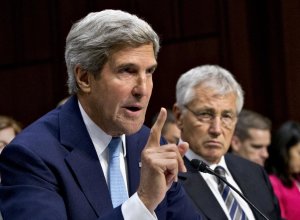

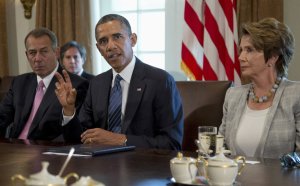
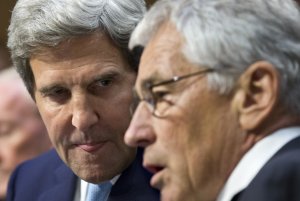







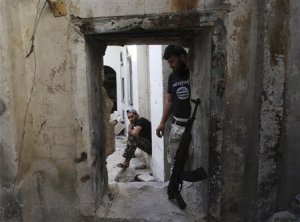

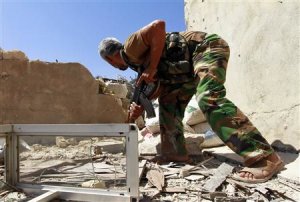




Tidak ada komentar:
Posting Komentar